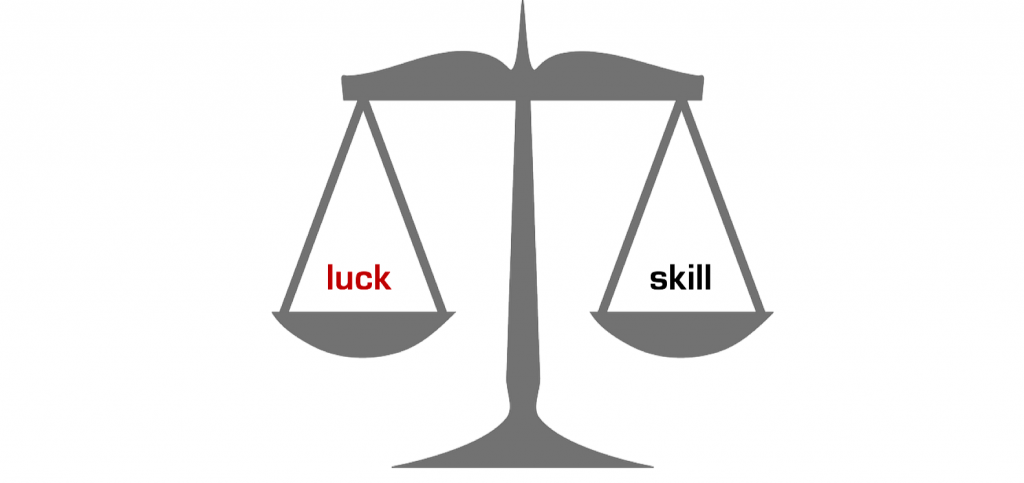Betting is a complex activity that involves a blend of luck and skill. Understanding the role of each is crucial for bettors who aim to maximize their winnings and minimize their losses. This article explores the intricate relationship between luck and skill in betting, providing insights into how bettors can leverage both to enhance their betting strategies.
The Element of Luck in Betting
Luck plays a significant role in betting, especially in short-term outcomes. It is the unpredictable factor that can lead to unexpected wins or losses, regardless of the bettor’s skill level.
Randomness and Uncertainty
Betting outcomes are inherently random and uncertain. No matter how well-researched or strategically placed a bet is, there is always an element of luck involved. This randomness is what makes betting exciting and unpredictable. For example, a last-minute goal in a football match or an unexpected injury can dramatically alter the outcome of a bet.
Short-Term Variance
In the short term, luck can have a substantial impact on betting results. Short-term variance refers to the fluctuations in outcomes that occur over a small number of bets. During this period, even the most skilled bettors can experience losing streaks, while less skilled bettors might enjoy winning streaks purely due to luck. This variance is a natural part of betting and is something that all bettors must accept and manage.
Examples of Luck in Betting
- Sports Betting: In sports betting, luck can manifest in various ways, such as refereeing decisions, weather conditions, or player injuries. These unpredictable factors can significantly influence the outcome of a match and, consequently, the result of a bet.
- Casino Games: In casino games like roulette or slots, luck is the primary determinant of outcomes. These games are designed to be random, with each spin or roll independent of the previous ones.
- Lotteries: Lotteries are the epitome of luck-based betting. The outcome is purely random, and there is no skill involved in selecting the winning numbers.
The Importance of Skill in Betting
While luck is a significant factor in betting, skill also plays a crucial role, especially in the long term. Skilled bettors can tilt the odds in their favor by employing strategic approaches and thorough analysis.
Research and Analysis
Skilled bettors invest time and effort in researching and analyzing various factors that can influence the outcome of a bet. This includes studying team statistics, player form, historical data, and other relevant information. By conducting thorough research, bettors can make more informed decisions and increase their chances of winning.
Bankroll Management
Effective bankroll management is a key skill in betting. It involves setting aside a specific amount of money for betting and managing it in a way that minimizes risk and maximizes potential returns. Skilled bettors use strategies like setting win/loss limits, diversifying bets, and avoiding chasing losses to manage their bankroll effectively.
Strategic Betting
Skilled bettors employ various strategies to enhance their betting outcomes. These strategies can include:
- Value Betting: Identifying and placing bets on outcomes that have a higher probability of occurring than the odds suggest. This involves finding inefficiencies in the bookmaker’s odds and exploiting them.
- Arbitrage Betting: Placing bets on all possible outcomes of an event with different bookmakers to guarantee a profit, regardless of the result. This strategy requires quick thinking and the ability to identify discrepancies in odds across multiple bookmakers.
- Hedging: Placing additional bets to reduce risk or guarantee a profit. Hedging is often used in in-play betting to lock in profits or minimize losses as the event unfolds.
Long-Term Consistency
In the long term, skill tends to outweigh luck in betting. Consistently applying research, analysis, bankroll management, and strategic betting can lead to more predictable and profitable outcomes. Skilled bettors understand that while luck can influence short-term results, their long-term success depends on their ability to make informed decisions and manage risk effectively.

Balancing Luck and Skill
To be successful in betting, it is essential to balance the elements of luck and skill. Recognizing when luck is playing a role and when skill can be applied is crucial for making informed betting decisions.
Accepting Luck’s Role
Bettors must accept that luck is an inherent part of betting and that short-term variance is inevitable. Embracing this uncertainty can help bettors maintain a calm and rational approach to betting, avoiding emotional decisions that can lead to poor outcomes.
Leveraging Skill
While accepting luck’s role, bettors should also focus on leveraging their skills to enhance their betting strategies. This involves:
- Continuous Learning: Staying updated with the latest trends, statistics, and betting strategies. The betting landscape is constantly evolving, and continuous learning is essential for staying ahead of the curve.
- Adaptability: Being flexible and adaptable in betting strategies. Different situations may require different approaches, and skilled bettors can adjust their strategies accordingly.
- Patience and Discipline: Maintaining patience and discipline in betting decisions. Avoiding impulsive bets and sticking to a well-researched strategy can lead to better long-term outcomes.
Practical Tips for Balancing Luck and Skill
Set Realistic Goals
Setting realistic goals is essential for balancing luck and skill in betting. Understanding that winning every bet is impossible and focusing on long-term profitability can help bettors maintain a balanced approach.
Diversify Betting Portfolio
Diversifying your betting portfolio can help mitigate the impact of luck and enhance the role of skill. By spreading bets across different sports, markets, and bookmakers, bettors can reduce risk and increase the chances of identifying value bets.
Keep Detailed Records
Keeping detailed records of betting activities can provide valuable insights into the role of luck and skill in betting outcomes. Analyzing past bets, identifying patterns, and learning from mistakes can help bettors refine their strategies and improve their skills.
Stay Informed
Staying informed about the latest developments in the betting world is crucial for leveraging skill effectively. This includes following sports news, analyzing team and player performances, and staying updated with changes in betting regulations and market trends.
Conclusion
The role of luck and skill in betting is complex and multifaceted. While luck plays a significant role in short-term outcomes, skill is essential for long-term success. By understanding and balancing these elements, bettors can enhance their betting strategies and increase their chances of winning. Embracing the unpredictability of luck while leveraging research, analysis, bankroll management, and strategic betting can lead to a more profitable and enjoyable betting experience.
